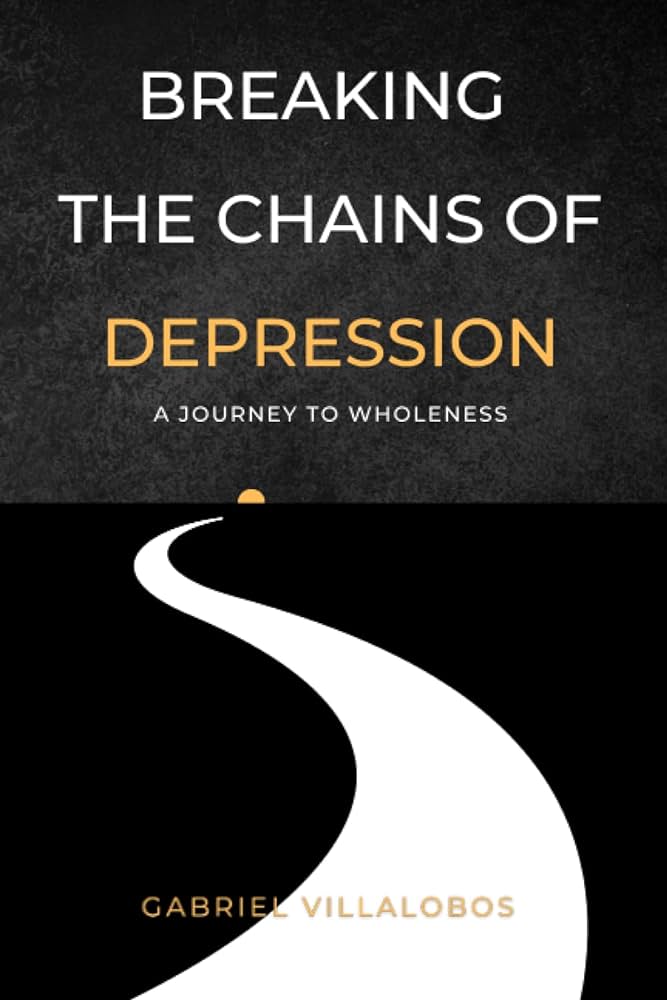Imagine a life free from the weight of depression, where the clouds of sadness slowly part and allow rays of joy to shine through. In this article, we will explore the journey of breaking the chains of depression and discovering the strength to overcome the darkness within. Through personal stories of triumph and practical tips, you will find inspiration and guidance to navigate the path towards healing and reclaiming your happiness. It’s time to let go of the chains and embrace a brighter future.

Understanding Depression
Depression is a mental health condition that affects millions of people worldwide. It is important to understand the different types of depression, the causes behind it, and the symptoms that individuals may experience.
Types of depression
There are various types of depression, each with its own unique characteristics. Major depressive disorder is one of the most common types, characterized by persistent feelings of sadness, hopelessness, and a loss of interest in activities once enjoyed. Dysthymia is a chronic form of depression that lasts for an extended period, often two years or more. Postpartum depression occurs in women after giving birth and is attributed to hormonal changes. Seasonal affective disorder (SAD) is closely linked to changes in seasons, often causing depressive episodes during the winter months.
Causes of depression
Depression can stem from a multitude of factors. Biological factors such as genetics and imbalances in brain chemicals, like serotonin, can contribute to its development. Life events, such as traumatic experiences, loss, or relationship difficulties, can also trigger depressive episodes. Additionally, certain medical conditions, such as chronic illnesses, can be associated with depression.
Symptoms of depression
Depression can manifest in a variety of ways, and the symptoms can vary from person to person. Common symptoms include persistent feelings of sadness, hopelessness, or emptiness, a loss of interest or pleasure in activities, changes in appetite or weight, difficulty sleeping or oversleeping, low energy, difficulty concentrating, feelings of guilt or worthlessness, and recurrent thoughts of death or suicide. It is important to recognize these symptoms and seek help if you or someone you know is experiencing them.
Seeking Professional Help
Seeking professional help is a crucial step in managing and overcoming depression. Mental health professionals have the knowledge and expertise to provide effective treatment and support.
Importance of professional help
While it may seem daunting to reach out for professional help, it is an essential part of the healing process. Mental health professionals, such as psychiatrists, psychologists, and therapists, are trained to assess and diagnose depression accurately. They can provide individualized treatment plans, including therapy, medication, or a combination of both. Professional help offers a safe and confidential space to discuss and explore the underlying causes of depression, learn coping strategies, and develop effective tools for managing symptoms.
Therapeutic approaches
There are several therapeutic approaches that mental health professionals may use to address depression. Cognitive-behavioral therapy (CBT) is a widely utilized and evidence-based approach that focuses on identifying and challenging negative thought patterns and behaviors. Interpersonal therapy (IPT) focuses on resolving relationship issues that may be contributing to depression. Psychodynamic therapy explores unconscious patterns and early life experiences. It is important to find a therapist who specializes in the specific approach that resonates with you.
Medication and other options
In addition to therapy, medication can play an important role in treating depression. Antidepressant medications, such as selective serotonin reuptake inhibitors (SSRIs) or serotonin and norepinephrine reuptake inhibitors (SNRIs), can help balance brain chemicals and alleviate symptoms. Other treatment options, such as electroconvulsive therapy (ECT) or transcranial magnetic stimulation (TMS), may be recommended for individuals who do not respond to traditional treatments. It is essential to work closely with a healthcare provider to determine the most appropriate course of treatment.

Building a Support Network
Building a support network can provide a strong foundation for overcoming depression. Surrounding yourself with understanding and compassionate individuals can make a significant difference in your journey to recovery.
Family and friends
Family and friends can offer invaluable support when it comes to depression. Having a trusted person to confide in can help alleviate feelings of loneliness and isolation. Loved ones can provide emotional support, lend a listening ear, and be a source of encouragement. It is important to communicate your needs to them and let them know how they can best support you during difficult times.
Support groups and therapy
Support groups and therapy provide opportunities for individuals with depression to connect with others who have similar experiences. Sharing and listening to personal stories can foster a sense of belonging and reduce feelings of isolation. Support groups can offer validation, encouragement, and practical coping strategies. Therapy, whether individual or group, allows for professional guidance and a safe space to explore and process emotions.
Online communities
In today’s digital age, online communities have become increasingly popular and accessible. There are various online forums, chat groups, and social media platforms dedicated to mental health support. These online spaces provide opportunities to connect with individuals worldwide who may be experiencing similar challenges. It is important to exercise caution and choose reputable platforms that prioritize privacy and safety.
Cultivating Self-Care Practices
Taking care of yourself is vital when it comes to managing depression. Engaging in self-care activities can help improve overall well-being and promote a positive mindset.
Importance of self-care
Self-care involves taking deliberate actions to prioritize your mental, emotional, and physical health. It is not selfish, but rather an essential aspect of maintaining a balanced and healthy life. Engaging in self-care activities can help reduce stress, enhance self-esteem, and improve overall mood. Making self-care a priority allows you to recharge, nurture yourself, and cultivate resilience in the face of challenges.
Physical health
Physical health plays a significant role in maintaining mental well-being. Exercise has been shown to have significant benefits for individuals with depression. Regular physical activity releases endorphins, often referred to as “feel-good” hormones, which can boost mood and reduce symptoms of depression. Eating a well-balanced diet and getting adequate sleep also contribute to overall physical and mental wellness. Prioritizing healthy habits can support recovery from depression.
Mental and emotional well-being
In addition to physical health, mental and emotional well-being are crucial aspects of self-care. Engaging in activities that bring joy and fulfillment, such as hobbies, creative outlets, or spending time in nature, can promote a positive mindset. Practicing mindfulness and relaxation techniques, such as meditation or deep breathing exercises, can help calm the mind and reduce anxiety. It is important to listen to your own needs and engage in activities that promote mental and emotional well-being.

Setting Realistic Goals
Setting goals can provide a sense of purpose and direction, helping individuals with depression regain motivation and a sense of accomplishment.
Identifying goals
To set realistic goals, it is essential to identify what is meaningful and important to you. Take some time to reflect on your values, passions, and aspirations. Consider both short-term and long-term goals and focus on areas of your life that may have been affected by depression. These goals may include academic or career achievements, relationships, hobbies, or personal growth.
Break goals down into manageable steps
Breaking larger goals into smaller, manageable steps can make them feel more attainable. Start by identifying specific actions you can take to work towards each goal. Break these actions into smaller tasks that you can accomplish on a daily or weekly basis. This approach not only makes the goals more achievable but also provides a sense of progress and accomplishment along the way.
Celebrate achievements
It is important to celebrate your achievements, no matter how small they may seem. Recognize and acknowledge the progress you have made toward your goals. Reward yourself for your efforts and give yourself credit for the obstacles you have overcome. Celebrating achievements can boost self-esteem, motivate further progress, and remind you of your ability to succeed.
Challenging Negative Thoughts
Negative thought patterns often accompany depression and can have a significant impact on one’s emotional well-being. Challenging these negative thoughts and replacing them with positive or realistic ones is an important step in the journey to recovery.
Recognizing negative thought patterns
Recognizing negative thought patterns is the first step in challenging them. Pay attention to your internal dialogue and identify common themes or patterns. Catastrophic thinking, overgeneralization, and personalization are common negative thought patterns associated with depression. Awareness of these patterns can help you actively challenge and reframe them.
Reframing negative thoughts
Reframing negative thoughts involves actively replacing them with more positive or realistic alternatives. Once you have recognized a negative thought, ask yourself if there is evidence to support it. Consider alternative explanations or interpretations of the situation. Replace negative self-talk with positive affirmations or kind and encouraging statements. Over time, reframing negative thoughts can lead to a more positive mindset and improved self-esteem.
Practicing positive affirmations
Positive affirmations are statements that promote self-empowerment and positivity. They can be used to counter negative self-talk and reinforce more positive beliefs about oneself. Some examples of positive affirmations include “I am strong and capable,” “I deserve love and happiness,” and “I am worthy of self-care and compassion.” Practicing positive affirmations regularly can help shift your perspective and promote a more positive self-image.

Incorporating Exercise into Daily Routine
Exercise has long been recognized as a powerful tool in improving mental health. Regular physical activity can significantly reduce symptoms of depression and enhance overall well-being.
Benefits of exercise for mental health
Engaging in regular exercise has numerous benefits for mental health. Physical activity stimulates the release of endorphins, which are natural mood-boosters. Exercise can also increase self-esteem, improve sleep quality, reduce anxiety, and alleviate symptoms of depression. Incorporating exercise into your daily routine can have a profound impact on your mental and emotional well-being.
Choosing the right type of exercise
The key to integrating exercise into your daily routine is finding activities that you enjoy and that suit your preferences and physical abilities. This could be anything from walking or jogging, swimming, dancing, yoga, or strength training. Experiment with different activities until you find what resonates with you. It is essential to listen to your body and choose activities that you genuinely enjoy to ensure long-term adherence.
Creating an exercise plan
To incorporate exercise into your daily routine, it can be helpful to create a specific plan. Set realistic goals for the frequency, duration, and type of exercise. Start with small, achievable steps and gradually increase the intensity or duration of your workouts. Scheduling exercise into your daily or weekly calendar can help make it a priority. Starting slow and gradually progressing can prevent burnout and increase the likelihood of long-term commitment.
Exploring Therapeutic Techniques
Therapeutic techniques provide additional tools for managing and overcoming depression. Various approaches, such as cognitive-behavioral therapy, mindfulness, and art therapy, can aid in the healing process.
Cognitive-behavioral therapy (CBT)
Cognitive-behavioral therapy (CBT) is a widely practiced therapeutic technique for depression. It focuses on identifying negative patterns of thinking and behaving and replacing them with more constructive and positive ones. CBT helps individuals recognize distorted thoughts, challenge them, and develop healthy coping strategies. It provides practical tools and techniques that can be applied in various areas of life, contributing to long-lasting changes in thought patterns and behaviors.
Mindfulness and meditation
Mindfulness and meditation techniques can be effective in managing depression. Mindfulness involves being fully present and aware of the present moment, without judgment. Engaging in mindfulness exercises can help reduce negative thinking, increase self-compassion, and improve emotional regulation. Meditation, on the other hand, involves setting aside specific time for focused attention and relaxation. Regular practice of mindfulness and meditation can enhance overall mental well-being and assist in managing depressive symptoms.
Art therapy and journaling
Art therapy and journaling are creative techniques that can be beneficial for individuals with depression. Art therapy allows individuals to express emotions through various art forms, such as painting, drawing, or sculpting. Engaging in creative activities can provide a sense of empowerment, promote self-expression, and serve as a healthy outlet for emotions. Journaling, on the other hand, involves writing down thoughts and feelings. It can be a therapeutic tool for self-reflection, exploring emotions, and gaining insight into personal experiences.

Adopting Healthy Coping Mechanisms
Coping with depression can be challenging, but it is important to avoid negative coping strategies and instead develop healthy mechanisms for managing stress and difficult emotions.
Avoiding negative coping strategies
Negative coping strategies, such as substance abuse, social isolation, self-harm, or excessive sleeping, may provide temporary relief but can exacerbate depressive symptoms in the long run. It is important to recognize these harmful patterns and make a deliberate effort to avoid them. Seeking healthier alternatives is crucial in building resilience and managing stress effectively.
Developing healthy coping mechanisms
Developing healthy coping mechanisms is essential for long-term well-being. Identify activities and practices that bring you comfort and relief, such as engaging in hobbies, spending time outdoors, practicing relaxation techniques, or seeking social support. Building a toolkit of healthy coping mechanisms allows you to navigate difficult emotions and stressful situations more effectively.
Finding balance and relaxation
Creating a balanced and relaxing lifestyle is key to managing depression. It is important to find a healthy balance between work, relationships, and personal time. Prioritize relaxation activities, such as taking baths, reading, listening to music, or practicing mindfulness. Self-care practices, such as deep breathing exercises or progressive muscle relaxation, can help calm the mind and promote relaxation. Finding moments of calm and tranquility can contribute to overall mental well-being.
Maintaining a Healthy Lifestyle
Maintaining a healthy lifestyle is crucial for managing depression and promoting overall well-being. Taking care of your physical health, getting enough sleep, and avoiding substance abuse are important factors to consider.
Balanced diet
Consuming a well-balanced diet is essential for physical and mental health. Avoiding excessive sugar, processed foods, and caffeine can prevent mood swings and energy crashes. Instead, opt for nutrient-dense foods, including fruits, vegetables, whole grains, lean proteins, and healthy fats. A healthy diet can provide the necessary nutrients to support brain function, stabilize mood, and enhance overall well-being.
Adequate sleep
Getting enough sleep is vital for mental health. Depression is often associated with sleep disturbances, including insomnia or excessive sleeping. Establishing a consistent sleep routine and practicing good sleep hygiene can improve the quality and duration of sleep. Avoiding electronics before bed, creating a calming sleep environment, and practicing relaxation techniques can contribute to a restful night’s sleep.
Avoiding substance abuse
Substance abuse can worsen symptoms of depression and hinder the healing process. Drugs and alcohol can impair cognitive function, exacerbate feelings of sadness or hopelessness, and interfere with medications. It is essential to seek healthy alternatives and support when coping with difficult emotions, rather than turning to substances that can have detrimental effects on mental health.
In conclusion, understanding depression is the first step towards breaking the chains that it imposes on individuals. Seeking professional help, building a support network, practicing self-care, setting realistic goals, challenging negative thoughts, incorporating exercise, exploring therapeutic techniques, adopting healthy coping mechanisms, and maintaining a healthy lifestyle are all essential aspects of managing and overcoming depression. By implementing these strategies, individuals can embark on a journey of healing and regain control over their lives. Remember, you are not alone, and there is hope for a brighter future.